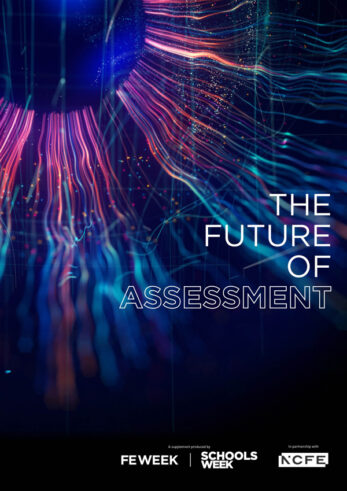I’m always telling my teenage children to get off their phones. Yet, however determined I might be that they actually talk in person to one another and their friends, I also know I couldn’t be a working mum without my mobile constantly by my side.
I too am torn. However necessary and handy technology is, you’ll find me dashing to the post box with handwritten Christmas cards to catch the final posting date. Sometimes, it’s just better to do things the traditional way. So I’m not a technology evangelist, but I am evangelical about anything that can demonstrably improve the life chances of students and apprentices. They are and always will be my compass.
In my first year in post, my priority has been the reintroduction of exams. In August, we achieved that. Teachers, parents, exam boards, Ofqual and most of all students working together saw the safe return to students getting grades for work produced in an exam hall. It’s a familiar sight, and may not appear modern, but it is the tried and tested way that we ensure all students are assessed by the same rules.
Now it’s time to look to the future. It’s what we committed to do in our three-year plan. Greater use of technology in GCSEs, A levels and other high-stakes exams is coming down the track. But we must be led by the evidence and do only what is right for students. It would not be right for an evidence-based regulator to determine the future of children’s assessment based on a gulp of the technology Kool-Aid, and the latest bright and shiny, but ultimately untried-at-scale technology.,
That’s why we have committed to careful, considered and thorough work to look at the opportunities, challenges, risks and benefits of technology in assessment. Our regulatory role is unique – affording us both the powers and the expertise to put in place the protections students need as exam boards start to trial new approaches to assessment.
We will make sure that awarding organisations adopt technology cautiously
It will not be Ofqual that develops onscreen assessment platforms, nor will it be Ofqual that secures the reliable broadband connection that each school will need. But we will use all our capabilities to make sure that awarding organisations adopt technology cautiously and always with students’ interests and valid assessment at the forefront of our decision-making.
I do not envisage a world where students sit exams solely onscreen. Handwriting is an essential part of our education and is best assessed with pen and paper. Many maths capabilities are assessed better when students can show their workings. Computer programming, however, is both an essential skill for the future economy and one we can all agree is better assessed on a computer. There will be others too where onscreen assessment enables more valid, lifelike and engaging assessment.
I am determined too that we explore fully the opportunities for technology to improve assessment for those with disabilities. The opportunities are there for the taking to provide easy adjustments for screen reading, font size changes and many others.
In my view, technology could play an important role in bringing an end to the necessary evil of tiering we are forced to accept in exams today. That won’t happen overnight, but the potential gains are substantial and worth time and careful consideration.
I am pleased that exam boards have announced a range of pilots and tests to begin to develop and refine their approach. Ofqual will be working with the Department for Education to play our part in assessing the options for safe adoption of onscreen assessment over the coming years. It’s two years since Ofqual published a report looking at the barriers and opportunities to high stakes assessment. Now it’s time to look seriously and carefully at how we overcome those barriers.
The move to digital assessment can only come about through joint endeavour. It will take schools, teachers, parents, exam boards, Department for Education, Ofqual and others to work together.
And as the successful return of pen-and-paper exams this summer has shown, that’s well within our grasp.














Your thoughts